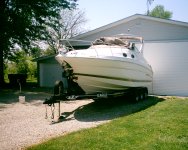jcmseven
Veteran Member
Fellow Posters:
I need a bit of advice and insight from the panel. My Ford 250 diesel has a moniker on the factory hitch that rates it as "12,500 pounds with weight distrubuting hitch and 6,000 pounds with load carrying hitch." I noted this when my truck was new and thought it seemed strange. It has not applied to me to this point as my current trailer already has a weight distributing hitch on it. I have an opportunity to buy a lightly used CornPro tilt top trailer, 22'. It does not have said hitch and has a large metal toolbox which I really like, but would have to be removed to accomodate a weight distributing hitch. I cannot determine why Ford says this, as the hitch from my view is extremely beefy, more so than the 2002 250 I regularly towed 9000-10000# with, and which had no such criteria. My owners manual does not address this. My friend's GMC, which has what appears to be the same type hitch, says nothing about this, nor does another friend with a Tundra. His hitch appears much less heavy duty than either mine or my friend's GMC hitch and does not even have any load rating noted on it. Assumably, Toyota would not mind someone hooking up the 10,000+ pound capacity load to this hitch. My questions are, first, why??? My Ford is a big truck and can handle a big load, so why the tiny rating without load distribution; and second, am I OK considering this a "suggestion" rather than a rule??? The CornPro tilt top weighes 4200# empty, so obviously one cannot pull much of a load without answering this question. Thanks for the help.
John M
I need a bit of advice and insight from the panel. My Ford 250 diesel has a moniker on the factory hitch that rates it as "12,500 pounds with weight distrubuting hitch and 6,000 pounds with load carrying hitch." I noted this when my truck was new and thought it seemed strange. It has not applied to me to this point as my current trailer already has a weight distributing hitch on it. I have an opportunity to buy a lightly used CornPro tilt top trailer, 22'. It does not have said hitch and has a large metal toolbox which I really like, but would have to be removed to accomodate a weight distributing hitch. I cannot determine why Ford says this, as the hitch from my view is extremely beefy, more so than the 2002 250 I regularly towed 9000-10000# with, and which had no such criteria. My owners manual does not address this. My friend's GMC, which has what appears to be the same type hitch, says nothing about this, nor does another friend with a Tundra. His hitch appears much less heavy duty than either mine or my friend's GMC hitch and does not even have any load rating noted on it. Assumably, Toyota would not mind someone hooking up the 10,000+ pound capacity load to this hitch. My questions are, first, why??? My Ford is a big truck and can handle a big load, so why the tiny rating without load distribution; and second, am I OK considering this a "suggestion" rather than a rule??? The CornPro tilt top weighes 4200# empty, so obviously one cannot pull much of a load without answering this question. Thanks for the help.
John M

